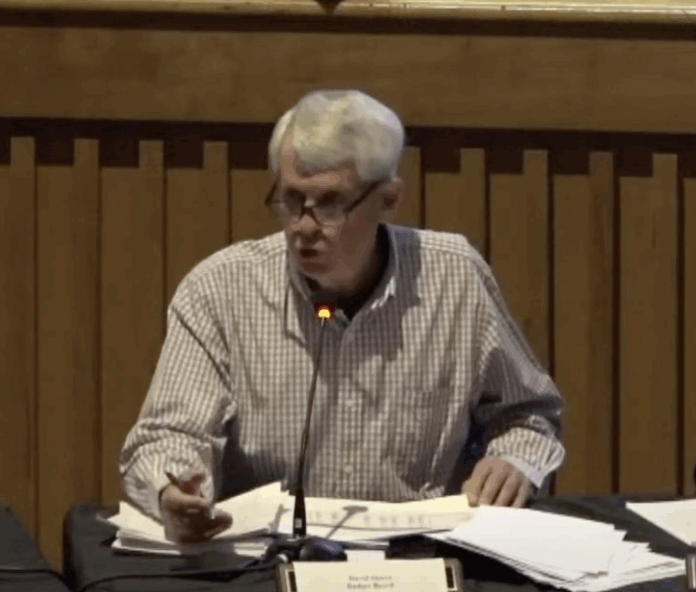GLOCESTER – Voters will get to make a decision on the Glocester town budget at a town referendum on Tuesday, May 20, weighing in on a fiscal plan totaling $34,567,000, an increase of $380,938, the maximum allowed according to state regulations.
“We are right at 4 percent,” said Town Council Vice President Walter Steere. “We can’t move another penny. I hope people get out and support this budget because if it doesn’t pass, we’ve got to cut it even more, and that’s across the board. That’s what happened last time we did it. It wasn’t a fun process.”
Of that total, the municipal side of the budget would increase by 2 percent, amounting to $9,816,723. The proposed increase for local schools is 6 percent for a total of $12,395,102. The regional schools total was $12,278,131.

That equates to an estimated $14.22 per $1,000 on residential property, $17.06 on commercial property, and $28.50 on tangible property. The four percent increase is the maximum allowable according to state regulations.
“The budget board went through this process and brought us a lot of good ideas out of a bad situation,” said Steere. “The finance director did a lot of hard work, the council and everyone involved in the budget process.”
The problem is, the local school district is short on funds and has already overspent on this year’s budget, an issue that Budget Board member David Steere pointed out at a recent meeting.
Budgeter Steere noted that the school district has already spent over $1 million more than their budget for the current year. The adopted budget for 2023-24 was $10,788,528, while the actual amount spent was $11,852,865. The revenue, however, was $500,000 plus more than anticipated. The bottom line, Steere said, was a deficit of $357,495, the second year in a row of deficit spending by the school department.
Supt. Renee Palazzo sent a memo to the council explaining that they were able to reduce the deficit to $150,000, and were planning on transferring funds from a reserve account of $370,000 to cover the shortage.
David Steere also pointed out that the Budget Board cannot make changes to the school budget, and that the document submitted for the hearing was not the one that had been previously submitted to budgeters. The one submitted to the budget board actually had an appropriation increase in excess of $2 million, while the new request showed a slightly lower increase of $1,242,217.
“Even if the Town Council said we were going to give everything to the School Committee, it is not that kind of money,” he said. “There’s just not that kind of money we can give to the School Committee.”
Previous longtime school committee member Walter Steere pointed out that, according to the Town Charter, the schools were prohibited from overspending their budgeted amounts without approval from the taxpayers at a financial town meeting called for that reason. Steere said the schools had over spent close to $1.5 million without that approval.
Town Clerk Jean Fecteau noted that the council worked hard on their budget to reduce it as much as possible, and, likewise, did everything they could to solve the problem.
“I know this council fought hard to find a solution,” she said. “We would fund the schools if we could, but we have no money to do that. And that is not going to solve the problem. I have agonized over this. It is a very difficult situation.”
At the recent town financial meeting, School Committee member Beth Keeling addressed the situation, explaining that the problem began 15 years ago when the state legislature recalculated the school funding formula for Rhode Island schools, causing Glocester to lose state aid over a 10 year period. The state also imposed unfunded mandates that added more burdens to the local schools.
Keeling explained how the schools have been spiraling over the course of recent years.
“The story of our elementary schools mess began 15 years ago, when the state legislature recalculated the school funding formula for Rhode Island schools,” she said. “Unfortunately, Glocester was one of the districts which lost state aid over a 10 year period.”
After meeting with the committee at the time, she recalled, the council agreed to give money to the schools to help make up for the loss of state aid under certain conditions, including that the funding did not go toward the town’s maintenance of effort. Under Rhode Island law, maintenance of effort means that municipalities must contribute an amount not less than its local contribution for schools in the previous fiscal year.
The committee made efforts to reduce costs by changing and reducing bus routes, moving students to different schools, and seeking help from the local Department of Public Works with paving projects and other maintenance.

“We did everything we could to mitigate the loss of state aid,” said Keeling. “The budget did work for awhile. We managed to get through each year; however, now that we’ve hit this point with money not going to maintenance of effort and no longer having a fund balance, we’re in this trouble.”
She recalled Steere getting up and telling the council two years ago that the schools needed money. That year, they had asked for a 2.82 percent increase and received 0.55 percent, she said. Enrollment has remained the same and staff numbers have remained the same.
Fecteau noted that one of the problems preventing more local revenues from going to the elementary schools is the regional budget, which the council has no control over. The regional schools present a budget to taxpayers at an annual financial town meeting, and, if approved, it is automatically tacked on to the town budget. In recent years, that has reduced the amount the town can spend. If less were appropriated for regional expenses, more would be available at the town and local schools level.
Although the superintendent and school committee have not shared a revised budget with the council, it could show a loss of teachers or aides in the district, among other cuts.
“It’s hard to watch,” said Fecteau. “But there is no money. This is probably the biggest dilemma since I have started working here in this town.”
Should the budget fail, however, things could get worse. If it fails, then the town must survive on its current budget until another referendum is presented, which might take upwards of 45-50 days.
Former longtime Town Council President Ted Burlingame recalled the local schools having a surplus of more than $1 million at one point. The town, which owns the local school buildings, renovated those buildings, as well. The surplus, however, was spent.
“This problem they have now stems from a couple of things,” said Burlingame. “No one was paying attention to the schools’ spending, which, basically, is the superintendent’s job, as well as the school committee. They just kept spending. It just fell apart in the last four years.”
Adding to the problems, he said, was the Covid situation, as well as a lack of monies being set aside for unexpected costs, such as students with special needs, and unfunded mandates. He echoed others’ concerns about the possible failure of the referendum.
“If the voters say no, the schools aren’t going to get 6 percent,” he warned. “They are going to have to get by with less than what they have. We hope they get their act together.”
“It was a very difficult process to this point,” said Councilor Steere at the recent council meeting. “I hope people understand this is a very difficult situation we are in and what we are trying to do is the best we can at this time.”
“I agree,” said Council President William Worthy.








maybe it is time for a forensic audit of the school districts. both Glocester and the regional schools.
I agree 100% And who is responsible for the missing money?